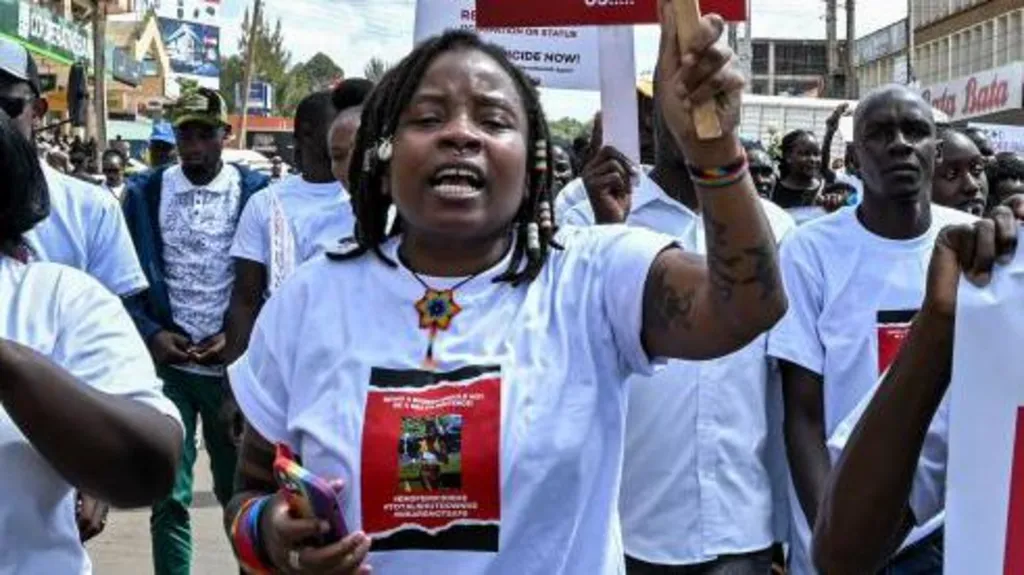The murder of Olympic runner Rebecca Cheptegei by her former partner has reignited calls for stronger action against femicide in Kenya.
The 33-year-old Ugandan died days after being doused in petrol and set alight by her ex-boyfriend at her home in Trans Nzoia county in western Kenya.
This is not an isolated incident. Kenya has one of the highest rates of violence against women in Africa.
Media reports say that in January alone more than 10 women in the country were victims of femicide, defined by the UN as the killing of women because of their gender.
Jane, not her real name, tells the BBC she has been in hiding for the better part of the year.
She says she is unable to go back to work due to life-changing injuries inflicted by her ex-partner during a brutal stabbing.
“His intention was to kill me. He stabbed me and left me for dead. Were it not for the neighbours, I would be dead,” Jane recalls.
She says she endured decades of worsening abuse before she left. Her breaking-point was when he started his aggression towards the children, she says.
“It was hell living with him. I don’t know how I persevered for those many years,” Jane adds.
Her estranged husband continues to harass her.
“I live in fear. He says he wants to finish me off. I can’t sleep at night. I’m now on medication to help with my mental health. I’m not the perpetrator but I’m living like I’m in jail.”
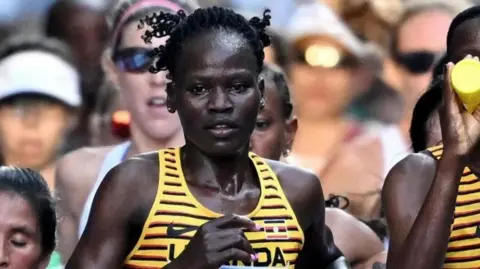
A 2018 World Health Organization (WHO) report suggested that 38% of women in Kenya aged between 15 and 49 had experienced violence from an intimate partner.
Groups that offer support to survivors of gender-based violence say there has been a year-on-year increase in the number of cases.
“On average, we receive up to 50 calls and sometimes 20 walk-ins in a day,” Njeri Migwi tells the BBC.
She is the head of Usikimye – Swahili for “don’t be silent”.
In 2021, then President Uhuru Kenyatta declared gender-based violence “a national crisis”.
A year later, a government report found 41% of married women had experienced physical violence.
A survey by Africa Data Hub found that between 2016 and 2023, there were more than 500 reported cases of women being killed in Kenya.
“In 75% of cases, killings were committed by a person who knew the murdered woman – an intimate partner, relative or friend,” the report says.
Sunita Caminha, UN Women specialist on ending violence against women and girls in East and southern Africa, says that women and girls of diverse backgrounds have been victims of femicide in a world marred by widespread gender discrimination and inequality.
In the latest UN report on violence against women and girls, Africa accounts for the largest share, with 20,000 women murdered.
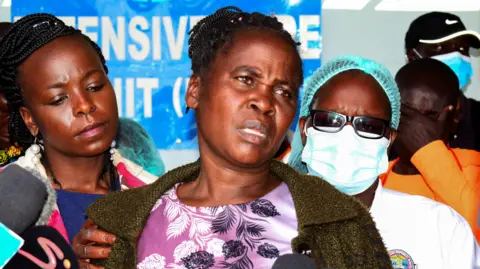
Long-distance runner Joan Chelimo says the killing of Cheptegei has left her traumatised.
“I can’t sleep, imagining that someone was just burnt alive,” she adds.
Cheptegei’s ex-partner subsequently also died of burn wounds that he sustained in the attack on her.
Ms Chelimo is a co-founder of Tirop’s Angels, an organisation formed after the killing of another athlete, Agnes Tirop.
She says that Cheptegei reported the abuse she faced to police, but “nothing happened”.
“So the perpetrators are not held accountable,” Ms Chelimo adds.
Police have denied claims that Cheptegei reported her life was in danger.
Kenya has passed laws to address gender-based violence, but critics say few concrete measures are in place to tackle the scourge.
Judy Gitau, the Africa regional director for campaign group Equality Now, says that “unfortunately, governments often feel that once they have a law, that’s it – not understanding that laws don’t execute themselves and they don’t enforce themselves”.
Jane says that over the years her reports of abuse were dismissed.
“Many times, the police say these are domestic quarrels. In fact, one policewoman I spoke to said: ‘We cannot arrest him until he does something.’ I asked her: ‘Do you want him to kill me?’
“The next day is when he stabbed me,” Jane recalls.
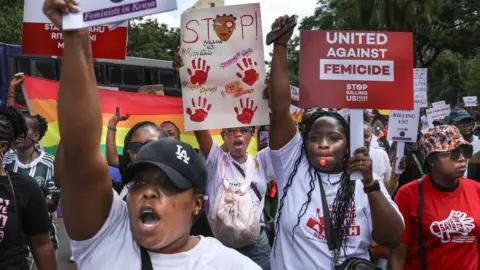
In 2004, police gender desks were introduced in Kenya to make it easier for women to report cases of gender-based violence, and for investigations to be sped up.
However, only half of police stations have them. Police say this is because of a lack of resources.
In Trans Nzoia, where Cheptegei lived, there are five police stations, but none has gender desks – the only one is at the county headquarters, says Kennedy Apindi, the head of criminal investigations in the county.
“So reporting of these cases is a problem. They are reported late, or they are unreported until you hear about them in the media and that’s when the police come into action,” he adds.
Cheptegei was the third female athlete to die in Kenya allegedly at the hands of an intimate partner in the last three years.
In 2021, merely five weeks after Agnes Tirop broke a 10km road-running world record in Germany, she was found killed in her home.
The 25-year-old had multiple stab wounds on her neck and abdomen.
Her partner Ibrahim Rotich was arrested by police 640km (400 miles) away in Changamwe, on Kenya’s coast.
Three years after she was killed, the case is still in court, with Mr Rotich out on bond. He has pleaded not guilty to a charge of murder.
Other cases also run for years.
Ms Gitau, who sits on a judiciary committee set up to review the timelines for cases involving gender-based violence, says the delays are unacceptable.
“There must be prioritisation of GBV [gender-based violence],” she says.
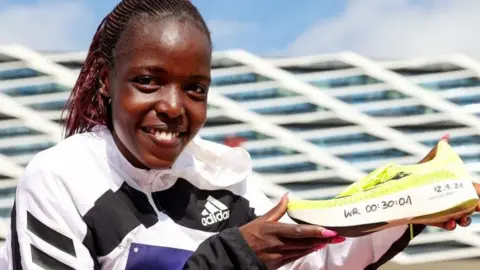
Just six months after Tirop’s killing, Kenyan-born Bahrain runner Damaris Muthee Mutua was found dead in her home in Iten, a running hub in Kenya’s Rift Valley.
A police autopsy revealed that the 28-year-old had been strangled.
Nobody has been convicted of her killing.
Police said they were looking for her boyfriend in connection with the death.
Just like Cheptegei, both athletes allegedly reported quarrels over money and property with their partners before meeting their deaths.
In many East African communities, gender-based violence is driven by patriarchal beliefs, placing women in subordinate roles. Their independence is limited, and violence is normalised as a form of control.
Ms Gitau is calling for more safe houses for survivors.
“Deep down, our attitudes, the norms that we hold as a country, still view women in a certain light,” she says.
Expressing a similar view, Ms Chelimo says the substantial amount of money that female athletes make, or stand to earn, leaves them vulnerable.
“They go against traditional gender norms… Female athletes are now becoming more independent, financially independent, and the other gender is really upset about it,” Ms Chelimo adds.
The government says it is running sensitisation programmes, while reviewing legislation to tackle gender-based violence.
“We don’t want this to happen to any other woman, whether an athlete, or from the village, or a young girl. We need to make sure that the gender police officers are doing their work,” Rachel Kamweru from Kenya’s State Gender Department tells the BBC.
Jane says her life rests in the government’s hands, and she hopes that it will do more to protect women like her from their ex-partners.
“As long as he is free, I’ll never have peace,” she says.
